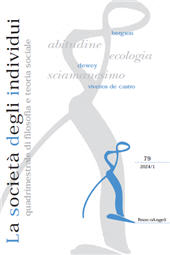Esercitati, adattati, inclinati corpi alla prova dell'abitudine
39-51 p.
The contribution addresses the topic of bodily habits from both a historical and theoretical perspective. It illustrates the ancient, Aristotelian premises, according to which habits have a non-intellectual but practical connotation, the modern turning point, in which a neutral, non moral consideration of bodily habits emerges, together with the study of their neurophysiological correlates, until arriving at the centrality of bodily habits in 20th-century philosophy, after the 19th-century leg marked by the development of the so-called "double law of habit". The contribution brings into focus a conception of bodily self that is influenced by French phenomenological thought and American pragmatist tradition, especially Merleau-Ponty in the first case, and Dewey in the second. In support of this conception, recent developments in the philosophies of habit are investigated, both in dialogue with neurosciences and with non-Western traditions, such as the Japanese. [Publisher's text].
Fa parte di
Società degli individui : 79, 1, 2024-
Articoli dello stesso fascicolo (disponibili singolarmente)
-
Informazioni
Codice DOI: 10.3280/LAS2024-079004
ISSN: 1972-5752
PAROLE CHIAVE
- Philosophy of Habit, Corporeality, Repetition, Automatisms, Active Intuition


